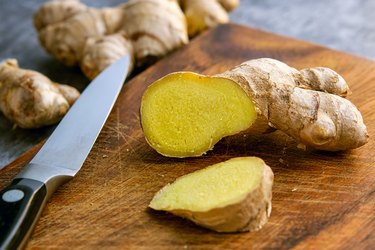
Ginger is a zingy addition to tons of recipes, and it's used in many home remedies. But there are risks of overloading on the pungent plant. Eating too much ginger may cause digestive issues and irritation, among other problems. Tread gingerly: Some people may also want to avoid this root entirely.
Healers for centuries have been using ginger to treat stomach issues. Ginger may ease pregnancy-related nausea and vomiting and chemotherapy-related nausea (as an adjunct to regular therapy), according to the National Center for Complementary and Integrative Health (NCCIH). It comes in many forms, including fresh and dried root, tablets and capsules, liquid extracts and tea.
Video of the Day
Video of the Day
Read more: The Heart Benefits and Harms of Ginger
How Much Ginger Is Too Much?
Using ginger in cooking or as a spice is safe, with very few risks, according to the NCCIH.
However, if you're taking it as a home remedy or dietary supplement, avoid the risks of eating too much ginger root by taking no more than 3 to 4 grams per day, says Christa Brown, MS, RDN, a registered dietitian nutritionist in private practice in San Francisco, California. "Research has noted some people experience negative side effects after consuming 6 grams or more," she says.
The Risks of Eating Too Much Ginger
Heartburn
Heartburn is one of the most common risks of eating too much ginger root, Brown says. This is confirmed in a January 2020 review in Nutrients, which took a comprehensive look at the health effects of ginger. Heartburn was a reported symptom in 16 of the 17 studies reviewed.
Mouth and Throat Irritation
Ever drink ginger juice and feel burning in your mouth or throat? This may be caused by the compound gingerol — which is a structurally similar cousin to the capsaicin that gives peppers their kick, per a December 2019 lab study in the Journal of Ethnopharmacology. You definitely don't want to overdo it. For some people, spicy foods can irritate the mouth and throat, notes the American Academy of Oral Medicine.
Generally, the amount used in most recipes won't be enough to cause mouth irritation, NCCIH says, but you may run into problems if you eat large quantities.
Digestive Issues
Just as ginger may help ease symptoms of nausea and vomiting, eating too much ginger root can actually cause diarrhea, gas and general stomach discomfort in some people, according to the NCCIH.
The January 2020 Nutrients study also found that some people in the studies complained of nausea as a result of taking ginger, even though they were taking the ginger as a natural remedy for nausea.
Additionally, some evidence suggests that ginger may increase the flow of bile, a secretion that helps your body break down fat, according to an April 2013 article in Food & Function. For people with gallstones, which are affected by bile secretions, this may make symptoms due to gallstones more likely.
Increased Bleeding Risk
Finally, large amounts of ginger may slightly increase your bleeding risk because of its active blood-thinning compounds, according to an October 2015 review in PLOS One. While the review noted mixed results in human studies, NCCIH notes that concerns, while not yet proven, have been raised.
"Those who are on blood-thinning medications should consult with their doctor," Brown says, "as there can be adverse reactions to consuming ginger while on anticoagulants."
Who Should Not Take Ginger Root?
According to the NCCIH, you may want to hold off on a ginger supplement if you:
- Have gallstone disease
- Take blood-thinning medication
- Are pregnant
Confirm with your doctor that ginger root is safe for you.
Ginger side effects for people with kidney disease may also be a concern. The National Kidney Foundation lists ginger as an herb to avoid, along with several others, if you are taking other medications, as it may interfere.
The NCCIH recommends that if it's safe for you to try ginger root supplements, you should:
- Stick to the dose on the label
- Stop taking it and tell your doctor if you experience any side effects
- Tell your doctors about all the herbal and dietary supplements you take so that they can better understand what you do to stay healthy
Read more: Is Crystallized Ginger Good for You?
- Journal of Ethnopharmacology: “Capsaicin and Gingerol Analogues Inhibit the Growth of Efflux-Multidrug Resistant Bacteria and R-Plasmids Conjugal Transfer”
- American Academy of Oral Medicine: “Oral Hypersensitivity Reactions”
- National Center for Complementary and Integrative Health: “Ginger”
- Christa Brown, MS, RDN, private practice registered dietitian nutritionist in San Francisco, California
- Nutrients: “Ginger on Human Health: A Comprehensive Systematic Review of 109 Randomized Controlled Trials”
- Food & Function: “Dietary Spices as Beneficial Modulators of Lipid Profile in Conditions of Metabolic Disorders and Diseases”
- PLOS One: “The Effect of Ginger (Zingiber officinale) on Platelet Aggregation: A Systematic Literature Review”
- National Center for Complementary and Integrative Health: “Using Dietary Supplements Wisely”
- National Kidney Foundation: “Herbal Supplements and Kidney Disease”
Is this an emergency? If you are experiencing serious medical symptoms, please see the National Library of Medicine’s list of signs you need emergency medical attention or call 911.